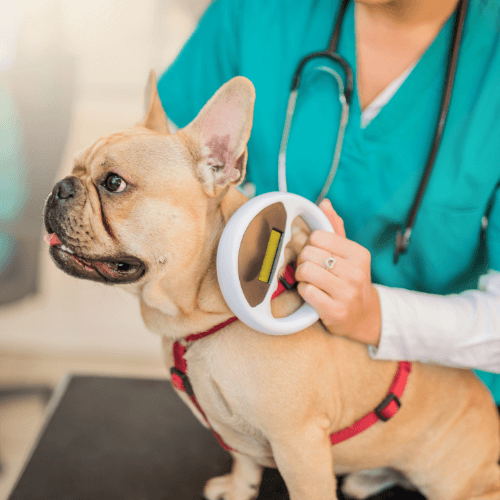Veterinary Services
Pet Microchipping at Northwood Animal Hospital in High Point, NC
Ensure your pet’s safety with microchipping services at Northwood Animal Hospital. Get reliable, permanent identification for your beloved companion.

Why Microchipping Your Pet Matters
Microchipping your pet is a simple yet crucial step in ensuring their safety and well-being. At Northwood Animal Hospital, we understand the importance of reliable identification for your beloved companion. Our pet microchipping service offers a permanent way to identify your pet, providing peace of mind for you and protection for your furry friend.
Imagine if your pet gets lost or separated from you. With a microchip, their unique ID number can be scanned by veterinarians, animal shelters, or rescue organizations, helping them quickly reunite you with your pet. Microchipping is a quick and virtually painless procedure, similar to a routine vaccination. A tiny microchip, about the size of a grain of rice, is inserted under your pet’s skin between their shoulder blades. This chip contains a unique identification number that is linked to your contact information in a national pet recovery database. Unlike collars or tags, which can be lost or removed, a microchip is a reliable form of identification that stays with your pet for life.

Why Choose Pet Microchipping?
- Permanent Identification: Collars and tags can break or fall off, but a microchip is a permanent form of identification.
- Increased Chance of Return: Pets with microchips are more likely to be reunited with their owners if they end up in a shelter or veterinary clinic.
- Quick and Painless Procedure: The microchipping procedure is quick, safe, and virtually painless for your pet.
- Peace of Mind: Knowing your pet has a microchip gives you peace of mind, especially if your pet is prone to wandering or escaping.
When is Pet Microchipping Necessary?
We recommend microchipping for all pets, regardless of their indoor or outdoor status. However, it is particularly important for:
-
Outdoor Pets: Pets that spend time outdoors have a higher risk of getting lost due to their exposure to unfamiliar territory, wildlife, and potential escape routes. A microchip provides a reliable means of identification if they wander beyond their usual boundaries.
-
Traveling Pets: If you travel with your pet, whether it’s on vacation, to the vet, or even just for a walk in a new area, a microchip is essential. In unfamiliar places, the chances of your pet becoming lost increase. A microchip ensures that if they do get separated from you, they can be identified and returned to you promptly.
-
Senior Pets: Older pets may experience cognitive decline or physical limitations that make it easier for them to become disoriented or lost. A microchip is crucial for senior pets to ensure they can be quickly reunited with their families if they wander off.
-
Young Pets: Puppies and kittens are naturally curious and may not yet have a strong sense of boundaries. They may wander off while exploring, and their small size can make it difficult for people to notice them if they get lost.
Key Benefits of Pet Microchipping
-
Convenience: Unlike collars and tags which can fall off or be removed, a microchip is a permanent identification method that your pet carries for life.
-
Unobtrusive: The microchip is about the size of a grain of rice and is implanted under your pet’s skin. Your pet won’t even feel it, but it provides a constant means of identification.
-
Increased Chance of Return: Studies show that microchipped pets have a significantly higher chance of being returned to their owners compared to those without microchips.
-
24/7 Access: The information on the microchip is available 24/7 to animal shelters, veterinarians, and animal control officers, increasing the chances of a quick reunion in case your pet gets lost.
-
Peace of Mind During Emergencies: In emergencies such as natural disasters or accidents, having your pet microchipped ensures that even if collars are lost, your contact information is accessible.
-
Helps Prevent Pet Theft: A microchip provides a permanent form of identification that cannot be easily altered or removed, making it a deterrent for pet theft.
How Does Pet Microchipping Work?
The microchipping process is straightforward and can be done during a routine veterinary visit. Here’s how it works:
- Insertion: The microchip is inserted under the skin using a needle. This is usually done between the shoulder blades, where it is not easily visible.
- Registration: Once the microchip is inserted, we will help you register your pet’s microchip with your contact information in the national pet recovery database.
- Scanning: If your pet ever goes missing and is found, animal shelters, veterinary clinics, and animal control officers have scanners that can read the microchip’s unique identification number.
- Reunion: When the microchip is scanned, your contact information will appear, allowing the finder to contact you and reunite you with your pet.
